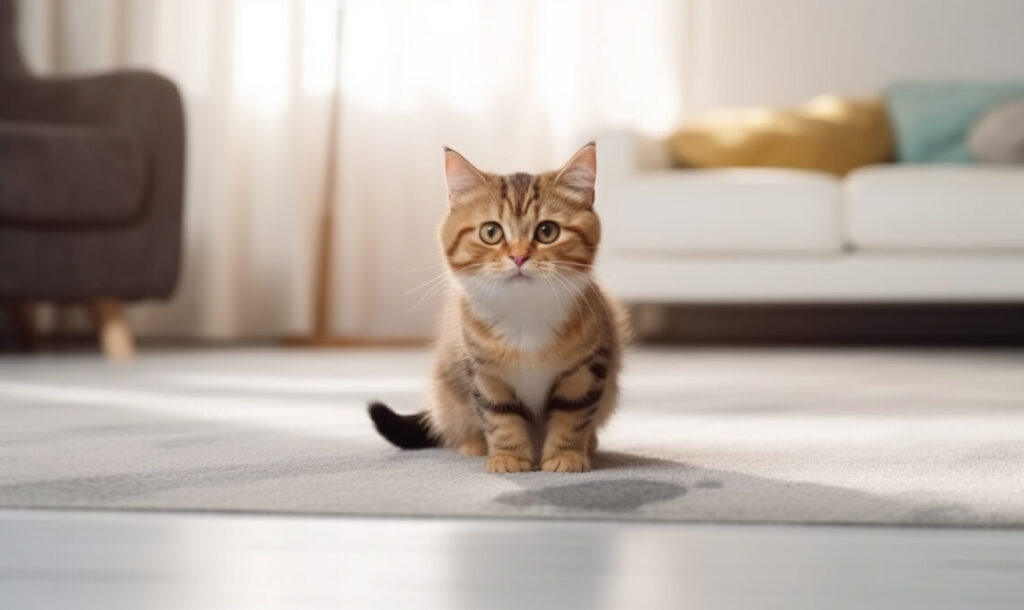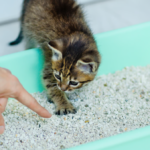Cats can start peeing or pooping everywhere in the house, from the floor to the bed, and some even choose specific spots like the bathtub. Understanding why your cat is urinating outside her litter box is crucial before trying to fix the issue.
Cats urinate outside the litter box for medical or behavioral reasons. Below are nine possible reasons why cats do this and what you can do to help.
As an Amazon Associate I earn from qualifying purchases.This post may contain affiliate links. Please see the Disclosure Policy for details.
Why is my cat peeing everywhere and not using the litter box?
Medical Reasons
If your cat is peeing outside the litter box, the first thing to do is visit your vet. The vet will perform a physical exam and analyze a urine sample. Depending on the results, treatment will be recommended. There are several medical conditions that may cause your cat to urinate inappropriately, such as:
Urinary Tract Infection (UTI): Though UTIs are rare in younger cats, they often cause problems in older ones. Bacteria in the urine might trigger inflammation in the urinary tract. Antibiotics are usually prescribed, and follow-up tests are necessary to ensure the infection is gone.
Bladder Stones: Some cats develop stones in their bladder, which can irritate and block the urinary tract. If your vet suspects stones, X-rays will be required to assess their size and number. Small stones might be managed with a special diet, but larger stones could need surgical removal. Cats with bladder stones often have UTIs, requiring antibiotics.
Idiopathic Cystitis: This condition involves bladder inflammation without a known cause. If your vet finds blood in your cat’s urine but no crystals, bacteria, or stones, idiopathic cystitis is likely. Diet changes, environmental enrichment, and possibly medication are typical treatments.
Behavioral Reasons
If no medical issues are found, your cat may be peeing outside the litter box due to behavioral factors. Some cats are very particular about their litter box conditions and won’t use the box if it’s not to their liking. Here’s what to check:
Litter Box Preferences: Cats might avoid their litter box if it’s in a noisy area, too close to high-traffic areas, or has a texture or scent they dislike. You may need to try different types of litter and boxes to find what your cat prefers.
Dirty Litter Box: Cats won’t use a dirty box. Scoop your cat’s litter box daily, clean it thoroughly every week or two, and refill it with fresh litter.
Old Urine Smells: If your cat has urinated on the floor or anywhere outside her box, the scent might remain, causing your cat to return to that spot. Use a urine detector to find stains, and clean thoroughly with a stain and odor remover.
Stress: Cats may also pee or poop outside the litter box due to stress. This could be caused by other animals in the house, new people, or changes in the environment. Ensure your cat has a quiet, safe space where she feels secure.
RELATED: The Best Cat Litter Box in 2024
Solutions
Once you understand the reasons behind the behavior, you can start working on a solution:
Rule Out Medical Causes: Always consult your vet first to eliminate any health issues. Even if your cat has no other symptoms, a medical cause could still be the reason she’s peeing outside the box.
Improve Litter Box Conditions: If medical reasons are ruled out, reconsider your cat’s litter box setup. Ensure it’s clean and in a quiet area. Use the largest litter box possible and try keeping it uncovered to avoid making your cat feel cramped.
Reduce Stress: Create a happy environment for your cat by providing toys, scratching posts, and vertical spaces like cat trees. Play with your cat regularly to reduce anxiety. If necessary, your vet might recommend calming supplements or, in severe cases, prescription medication.
Seek Professional Help: If things aren’t improving, consult a behaviorist for additional support. With patience and persistence, you can help your cat get back to using the litter box properly.



